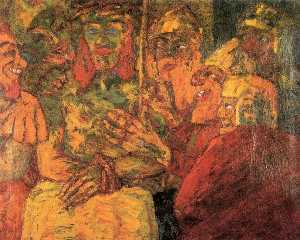Emile Nolde
Emile Nolde
Style: Expressionism;
Place: Nolde
Born: 1867
Death: 1956
Biography:
Early Life and Artistic Beginnings
Emil Nolde, a renowned German-Danish painter, was born on August 7, 1867, in Nolde, Schleswig-Holstein, Germany. Initially known as Hans Emil Hansen, he later adopted the pseudonym Emil Nolde. This change marked the beginning of his journey into the world of art.
Artistic Contributions and Style
Nolde is widely regarded as one of the first expressionists and a key member of Die Brücke (The Bridge), a group of German Expressionist artists. His pioneering work in oil and watercolor painting at the beginning of the 20th century led to an exploration of color like never seen before. Key Characteristics:**
Some of Nolde's most notable works include: Masks, a painting showcasing his unique approach to portraiture, can be found at the Nelson-Atkins Museum of Art (Kansas City, United States) [https://Wikioo.org/@@/D3XHNC-Hans-Emil-Hansen-Masks](https://Wikioo.org/@@/D3XHNC-Hans-Emil-Hansen-Masks). Another significant piece, Cupid and Psyche, demonstrates Nolde's ability to blend mythological themes with his expressionist style [https://Wikioo.org/@@/6WHKCT-Edvard-Munch-Cupid-and-Psyche](https://Wikioo.org/@@/6WHKCT-Edvard-Munch-Cupid-and-Psyche). Notable Works and Collections
Nolde's innovative use of color and his bold, expressive brushstrokes have influenced generations of artists. His work can be seen as a bridge between traditional representational art and the modern, abstract movements that followed. Important Links:** - [https://Wikioo.org/@/Hans-Emil-Hansen](https://Wikioo.org/@/Hans-Emil-Hansen) - Explore more of Nolde's works on Wikioo.org. - [https://Wikioo.org/Art.nsf/O/A@D3C5Y9](https://Wikioo.org/Art.nsf/O/A@D3C5Y9) - Discover the top 5 famous expressionism paintings, including some of Nolde's notable pieces. Legacy and Influence
Emil Nolde's expressive brushstrokes and pioneering spirit in the realm of color have left an indelible mark on the art world. His legacy continues to inspire artists and art lovers alike, making him a timeless figure in the history of German Expressionism.Conclusion














